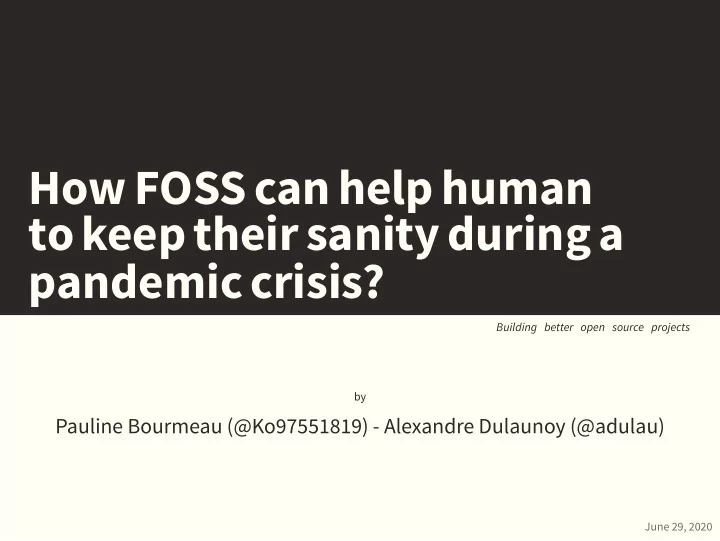

HowFOSScanhelphuman tokeeptheirsanityduringa pandemiccrisis? Building better open source projects by Pauline Bourmeau (@Ko97551819) - Alexandre Dulaunoy (@adulau) June 29, 2020
Background During the lockdown, should we work on an obscure open source natural language processing project or just do cloth face mask ? Another video chat.
Meaning of Life Doing something which is an imminent and vital need: face masks 1 It works and many open source rules and practices apply What did we learn? and help your next open source security project 1 https://mianmo-project.github.io/
Resonate and be human Users are wonderful things to have, and not just because they demonstrate that you’re serving a need, that you’ve done something right. 2 In other words, face masks without users are useless Be your first users , this will already saves life 2 The Cathedral and the Bazaar, Eric Steven Raymond
Try and don’t be afraid Learn from scratch Keep a trace and publish your failures Why git was under-used during the design of cloth face mask? Keeping track of all face mask design videos is a f*cking challenge 3 Pick a video and try 4 Filling the gap of written documentation 3but we enjoyed seeing the difgerent cultures through the lens of face mask design 4bound to YouTube recommendation algorithms
Tooling Ivan Illich defined convivial tools as those most accessible by each person, the least controlled by others, and without restricting equal use by others. 5 While designing and building face-masks, people took back the control of the tools by becoming producers They use the most easy and accessible tools (not always open source) to provide guidelines 5 Ivan Illich’s book ”Tools for Conviviality,” published in 1973.
Less ”Intellectual Property Rights” The fluidity of creative exchanges was helped by fewer legal constraints Social pressure can help in such period Many projects during the lock-down relied on existing open source, free sofuware and content licensing schemes A lot of cloth face mask designers didn’t know they were doing open source
Reinforcing Social Relationships Fun is key to keep sanity in an open source community With covid-19, all open source contributors discovered the social reality of existing remote contributors Relying on the existing experience of managing open source community 6 6 Social Architecture - Building On-line Communities by Pieter Hintjens
Fun is really important
How to cultivate your FOSS project? Fun is important but the gifu aspect is a strong community cement Sharing common tools and objectives to create values Create knowledge via open source projects as a medium Reciprocity to support self-management of open source communities Diverse contributors and contribution ensure project stability
Thank You Markdown format and all the open source rendering implementations Inkscape (to make cool logos for open source project) git (even if the handling of binary files is still hard) BBB BigBlueButton and Jitsi (diversity is good when one fails) Python (for extracting large table of filtering tests only available in crappy PDF generated from an unpublished XLS file) SciHub (thanks Alexandra) as it was the only way to download the academic papers about the filtering of textile fabrics All the people who did face masks and didn’t know they were part of the open source and maker community
Where We Succeeded The open source and maker communities resonated during the crisis with a lot of initiatives The past 20+ years of open source licensing did help a lot (less friction in exchange) Git repositories supported the coordination efgort on contributions and content publishing
Where We Failed Some open source tools are still too complex to use compared of the sharing of a YouTube video We are still bad at indexing, evaluating, coordinating and archiving projects (how many face mask designs on GitHub?) Release early, release ofuen. We failed there as early was a matter of days and not weeks Opportunity for new open source projects such as markdown notes taking and video screenshot at the same time
Bibliography 1. Ivan Illich, Tools for Conviviality, 1973. https://co-munity.net/system/files/ILLICH%201973_tools_for_convivality_1.pdf 2. Eric Steven Raymond, The Cathedral and the Bazaar, 1997. http://www.catb.org/~esr/writings/cathedral-bazaar/ 3. Pekka Himanen, The Hacker Ethic, 2001. 4. Pieter Hintjens, Social Architecture - Building On-line Communities, 2016. http://www.foo.be/docs-free/social-architecture/book.pdf
Recommend
More recommend